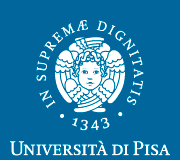
Email: giulia.cagnoli@phd.unipi.it
Supervisore tesi: Prof.ssa Valentina Virginia Ebani
Titolo progetto: Fattori di patogenicità e antibiotico-resistenza in ceppi di Escherichia coli in avifauna selvatica
Abstract: Escherichia coli è un batterio Gram negativo di forma coccobacillare, aerobio facoltativo, appartenente alla famiglia Enterobacteriaceae; la specie comprende numerosi sierotipi e patotipi che si differenziano per caratteri antigenici e fattori di patogenicità che influenzano la patogenesi delle infezioni. E. coli risiede normalmente nell’intestino di numerose specie animali. Data la sua localizzazione è un ottimo indicatore di contaminazione fecale come ad esempio nelle falde acquifere, acque reflue ma anche nella corretta gestione dei processi produttivi. In alcune circostanze E. coli può uscire dal tratto gastrointestinale e provocare diversi quadri patologici sia nell’uomo che negli animali, è chiaro dunque che alcuni ceppi siano in grado di provocare alterazioni a livello intestinale, ma anche extra-intestinali come per esempio infezioni al tratto urinario, peritoniti, polmoniti e meningiti. Gli animali, inclusi gli uccelli, anche in assenza di sintomatologia riportabile a colibacillosi, possono essere eliminatori fecali di E. coli appartententi a patotipi diversi. Tra questi ultimi sono di particolare interesse, anche per il loro aspetto zoonotico, gli E. coli enteropatogeni (EPEC), E. coli enterotossigeni (ETEC), E. coli enteroemorragici (EHEC), E. coli enteroinvasivi (EIEC), E.coli enteroaggreganti (EAEC). Il potere patogeno di E. coli è inoltre condizionato dalla resistenza agli antibiotici. Negli ultimi anni, l’attenzione è stata volta in modo particolare verso ceppi produttori di β-lattamasi ad ampio spettro (ESBL, extended spectrum beta-lactamase) e resistenti ai carbapenemi, che si sono dimostrati responsabili di gravi infezioni nell’uomo, soprattutto di natura nosocomiale. Scopo del presente progetto sarà quello di valutare il ruolo dell’avifauna selvatica nella diffusione di ceppi di E. coli appartenenti ai patotipi di maggiore interesse in medicina veterinaria e umana.
Project title: Pathotypes and antimicrobial resistance of Escherichia coli from wild avifauna
Abstract: Escherichia coli is a common inhabitant of the intestines of humans and animals, but in some cases it can cause severe infections in relation to the involved pathotype. Wild birds may act as reservoirs and spreaders of several pathogenic bacteria, mainly during their migratory activity, including E. coli. The aim of this study was to investigate the antibiotic resistance profiles of E. coli strains isolated from wild birds recovered in a rescue center in Central Italy and determine the pathotype for each isolate through the detection of genes encoding for specific virulence factors. Under certain circumstances E. coli can leave the gastrointestinal tract and cause different pathological pictures in both humans and animals, so it is clear that some strains are able to cause alterations in the intestines, but also extra-intestinal such as urinary tract infections, peritonitis, pneumonia and meningitis. Animals, including birds, even in the absence of symptoms reportable to colibacillosis, can be fecal eliminators of E. coli belonging to different pathotypes. Of particular interest among the latter, including their zoonotic aspect, are enteropathogenic E. coli (EPEC), enterotoxigenic E. coli (ETEC), enterohemorrhagic E. coli (EHEC), enteroinvasive E. coli (EIEC), and enteroaggregating E.coli (EAEC). The pathogenic power of E. coli is also affected by antibiotic resistance. In recent years, attention has been directed specifically toward extended-spectrum β-lactamase (ESBL)-producing and carbapenemase-resistant strains that have been shown to be responsible for serious infections in humans, especially nosocomial infections. The aim of this project will be to assess the role of wild birds in the spread of E. coli strains belonging to pathotypes of major interest in veterinary and human medicine.
ORCID ID: 0000-0001-8198-5865
Comunicazioni orali a congresso:
- G. Cagnoli, P. Bongi, F. Bertelloni, S. Piva, V.V. Ebani, M. Del Frate. “Nasal carriage of antimicrobial resistant Staphylococci by fallow deer (Dama dama) taken in a natural park of Tuscany, Central Italy.” 29th November 2024, Season Two – Games of Research, DSV-UNIPIsa Edition. Department of Veterinary Sciences, University of Pisa, Italy.
- G. Cagnoli, F. Bertelloni, V.V. Ebani, 2023. Pathotypes and antimicrobial resistance of Escherichia coli from wild avifauna. In: 2nd International PhD Student’s Conference at the University of Life Sciences in Lublin, Poland: Environment – Plant – Animal – Product
- G. Cagnoli, P. Bongi, F. Bertelloni, S. Piva, V.V. Ebani, M. Del Frate, 2024. Antibiotic-resistant Staphylococcus spp. in fallow deer (Dama dama) from Central Italy. In: 3rd International PhD Student’s Conference at the University of Life Sciences in Lublin, Poland: Environment – Plant – Animal – Product. https://doi.org/10.24326/ICDSUPL3.A004
- G. Cagnoli, A. Di Paolo, C. Trebino, F. Bertelloni, M. Marzoni, V.V. Ebani. “Antibiotico-resistenza in Enterococcus spp. isolati da polli”. Giornata scientifica in memoria del Prof. Ernesto Andreani, Scuola di Specializzazione in “Sanità Animale, Allevamento e Produzioni Zootecniche” e “Ispezione degli Alimenti di Origine Animale”, 19 Gennaio 2024, Dipartimento di Scienze Veterinarie, Università di Pisa.
E-Poster Presentations:
- G. Cagnoli, F. Bertelloni, R. Ceccherelli, V. V. Ebani. Occurrence of different antimicrobial-resistant pathotypes of Echerichia coli in seagulls (Larus michahellis) from Central Italy”. 23rd-25th October 2024, International Union of Microbiological Societies Congress (IUMS), Palazzo dei Congressi Piazza Adua, 1. 50123 Florence, Italy.
Poster a congresso:
- G. Cagnoli, F. Bertelloni, P. Interrante, R. Ceccherelli, M. Marzoni, V.V. Ebani. “Antimicrobial-resistant Enterococcus spp. in wild avifauna”. 24th November 2023, Season One – Games of Research, DSV-UNIPIsa Edition. Department of Veterinary Sciences, University of Pisa.
